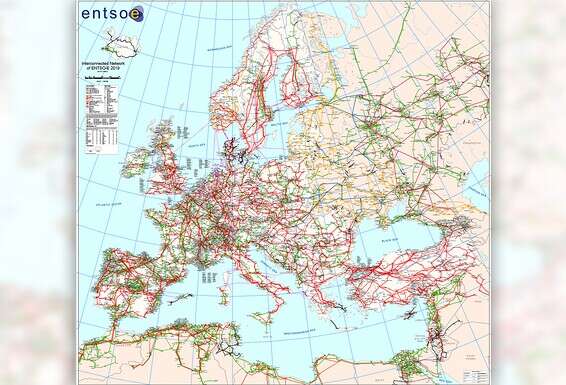The connection will be made via a cable 1,750 km long and at a depth of up to 3 km • The connection via Cyprus and Greece will allow transmission of up to 1,000 megawatts and later its power will be doubled
The power station in Ashdod
Photo:
Moshe Shai
Israel will soon connect to the European electricity grid.
Israel Today has learned that by the end of the year, Israel is expected to sign a first-of-its-kind agreement with Greece and Cyprus to build a submarine power cable that will be connected to the European electricity grid.
The project is expected to be completed by 2024, if no breakdowns occur or unexpected obstacles pile up.
Minister Steinitz recently spoke with Cyprus' new energy minister, Natasha Philides, who has expressed readiness to drive the move.
The cost of the project is estimated at NIS 3.1 billion, with the financing of the project by the Union and the partner countries, including Israel, to be determined later in accordance with the agreements to be signed between the parties.
The power cable, 1,750 km long and up to three km deep, is expected to leave Israel for Cyprus, from there to Crete and the Greek peninsula, and thus connect to the European grid.
In the initial phase, the cable will be able to receive and transmit 1,000 megawatts, and later its capacity will be doubled.
In 2017, Israelis consumed 57.1 thousand megawatts of electricity, which means that the new cable could contain between 20 and 40 percent of the average monthly electricity consumption of Israeli citizens.
This is the second cooperation in the field of infrastructure between the countries, after the natural gas pipeline project, the East-Med, was signed in Athens last January, which will connect the Levitan and Aphrodite fields in Cyprus to Greece and from there to other parts of Europe.
"As part of the Euro-Asia project, a power supply cable will be laid between Israel, Cyprus, Greece and the European Union," reads the draft memorandum of understanding sent from the Israeli Ministry of Energy to its counterparts in Greece and Cyprus and reached Israel Today.
"The project will promote security and regional energy prosperity, and is a significant component of the tripartite strategic cooperation between the parties. And promoting competition between electricity suppliers to create more efficient energy markets. "
The new cable is expected to address the challenges facing the Israeli economy in promoting the transition to renewable energies and further establishing Israel's energy independence, as well as enabling the strengthening of strategic ties with the European continent.
The European Union and all the countries of the European continent are connected in one branch network and is spread between different countries and continents.
The connection allows the export and import of electricity between the EU countries and other neighboring countries such as Turkey, Ukraine, Morocco and more.
These connections optimize the electricity economy of the countries and help stabilize it, especially during the period of growth in the use of renewable energies, which are less stable than conventional energies.
EU policy stipulates that all EU countries will be connected to a common network, so that Cyprus remains among the last countries in the EU that is not connected to other countries.
In addition, EU policy includes targets for increasing connectivity and trade in electricity between EU countries, as the ability to trade in electricity optimizes the European electricity economy and contributes to meeting targets for reducing greenhouse gas emissions.
The Ministry of Energy explains that Israel has a geopolitical and political interest in connecting to the European grid, as well as a broad interest in providing an additional safety net to the Israeli electricity sector in terms of maintaining functional continuity and reliability of supply.
The Minister of Energy, Dr. Yuval Steinitz, told Israel Today that the project: "It will allow us to receive electrical backup from Europe in times of emergency and will also support our ability to significantly increase reliance on solar energy."

